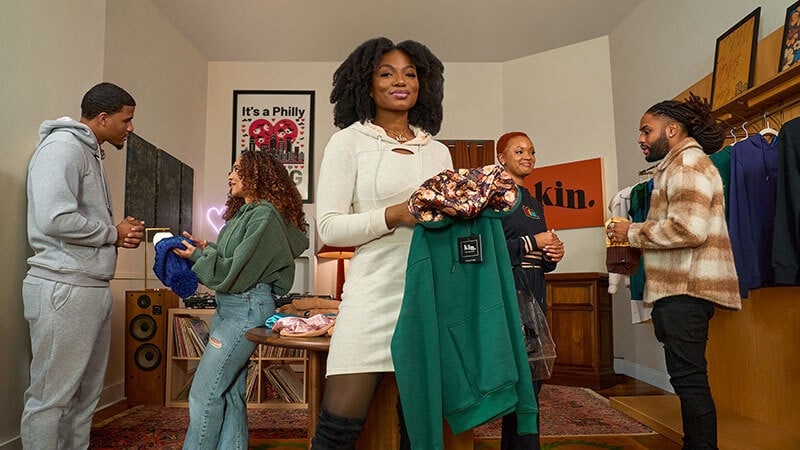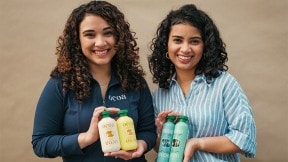Building a community one hoodie at a time
Meet the woman who’s disrupting the hoodie industry.

Participants compensated
In her college dorm at Princeton University, Philomina Kane wrestled with a dilemma: how to care for her newly growing natural hair without the right tools or clothes.
“I grew up in a family of hairstylists,” Kane says. “So before I left home, they always did my hair, and it was always chemically straightened.” But as a freshman and a self-described “broke college student,” she didn’t have the funds to go to the salon and spend $100 to get her hair done. Plus the stress of school was leading to hair breakage and loss. So she took the plunge, cut it all off and started her natural hair journey.
“I became obsessed with it — how to take care of my hair, how to make it grow healthily,” she says.
This obsession became the seed that would launch her natural-hair-friendly clothing brand, KIN Apparel, and bring together a thriving community and passionate customer base of “KINfolk.”
Natural inspiration, naturally successful
KIN — which stands for “Keep It Naturally” — is more than a brand name. It’s a mantra that resonates with a community of Black women embracing their natural beauty.
Starting as a YouTube channel called NaturallyPhilo, Kane’s college venture quickly gathered a following of nearly 200,000 subscribers, all drawn to her passion for natural hair care. This platform allowed her to document her own hair journey and to create a space where embracing natural beauty wasn’t just encouraged — it was celebrated.
When a creative agency recognized the potential in her large following, Kane seized the opportunity to make something tangible for her KINfolk. “I’d always wanted to make a satin-lined hoodie,” she recalls. The idea stemmed from her experiences on the college rugby field, where traditional cotton hoodies would strip the moisture from her hair. In 2019, she launched KIN Apparel’s protective satin-lined hoodies, and the flagship product became an embodiment of the brand’s ethos.
The hoodies weren’t just a hit. They were a statement — a symbol of the movement Kane had nurtured from her college dorm to the world. “I decided I’m going to put my all into KIN Apparel,” she says. The result? Explosive growth.
The year 2020 brought unprecedented attention to many Black businesses, including KIN Apparel. “There was so much love for KIN,” Kane recalls, “and that’s really how it grew.”
Community roots to market footholds
While community love for KIN Apparel was strong from the start, breaking into the competitive market was far from simple. Kane faced the intricate realities of manufacturing, unpredictable market trends and the intense work of building a foundation for her brand.
Navigating the complexities of production and staying afloat amid the ups and downs of market demand proved challenging. Supply chain complications posed risks that could have derailed the new business.
Kane’s approach to these issues was straightforward. “Transparency with our customers was key,” she explains. Her openness helped preserve the trust and loyalty of KIN’s customer base during tough times.
The brand’s breakthrough came with an appearance on “Shark Tank,” — a moment that marked a significant turning point. “I never even dreamt that big,” Kane confesses. Her pitch on the show led to a period of intense follow-up and ultimately a successful deal with Skims founding partner Emma Grede, which propelled KIN to new heights.
Mentorship and money matters
For Kane, the relationship with Chase has been a cornerstone of KIN’s operational success. She’s also enthusiastic about Chase’s influence on her team. “The mentorship program was amazing for Alyssa,” says Kane, referring to her director of operations who participated in the Chase for Business Coaching for Impact℠ mentorship program.
This program was a deep dive into the business side of things, imparting knowledge that was integral to KIN’s growth. “What the program delivered was the ability to better understand how the numbers coming into our business tell a story about where we are — and then how to use that story to guide where we want to be,” Kane says.
From an operational standpoint, Kane is currently working with Chase to determine which solutions can best benefit her business. In particular, she is exploring using Chase’s card reader solutions for KIN’s payment processing needs in pop-up shops.
As Chase continues to help KIN grow, the relationship is a testament to how the right one-stop-shop financial support can help accelerate a business’s growth, streamline its operations and allow founders to focus on doing what they do best — innovate and inspire.
A smooth path to a shiny future
Kane’s aspirations for KIN Apparel reflect a vibrant vision of growth and exploration. “We started with one black satin hoodie, and now we’re scaling up,” says Kane, whose ambition is reflected in the brand’s plans for expansion.
In addition to diversifying the company’s product offerings, plans include capturing new markets and introducing the KIN philosophy to fresh audiences. While 70% of the brand’s current customer base is Black, post-“Shark Tank,” KIN has seen an increase in interest from other audiences, including people with sensory sensitivities and those growing their hair back after chemotherapy.
As Kane looks ahead, she sees KIN poised to weave new narratives into the tapestry of the fashion industry. And in this story of entrepreneurship and ambition, the conclusion is clear: Kane and KIN Apparel are not only keeping it natural — they’re keeping it unstoppable.



